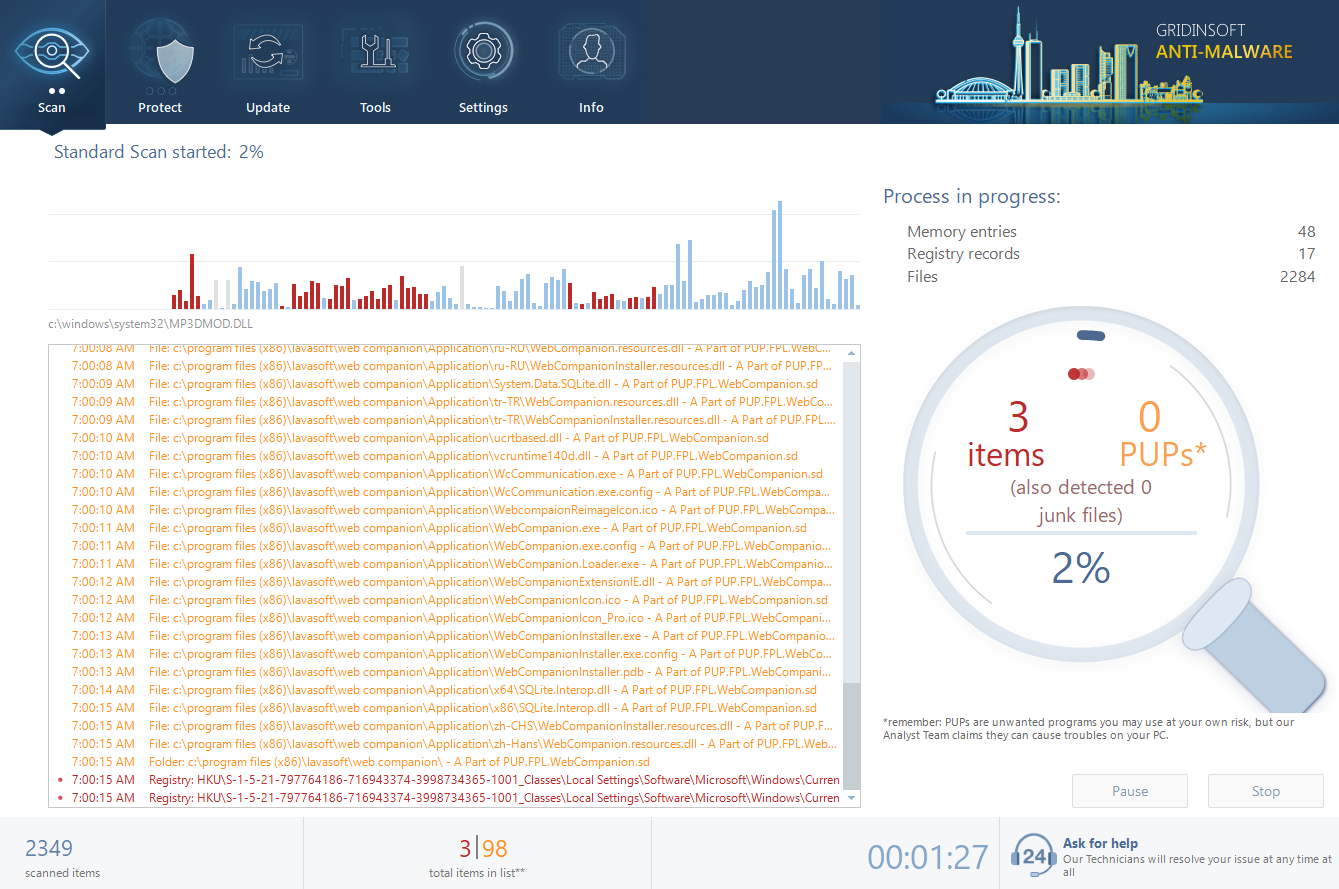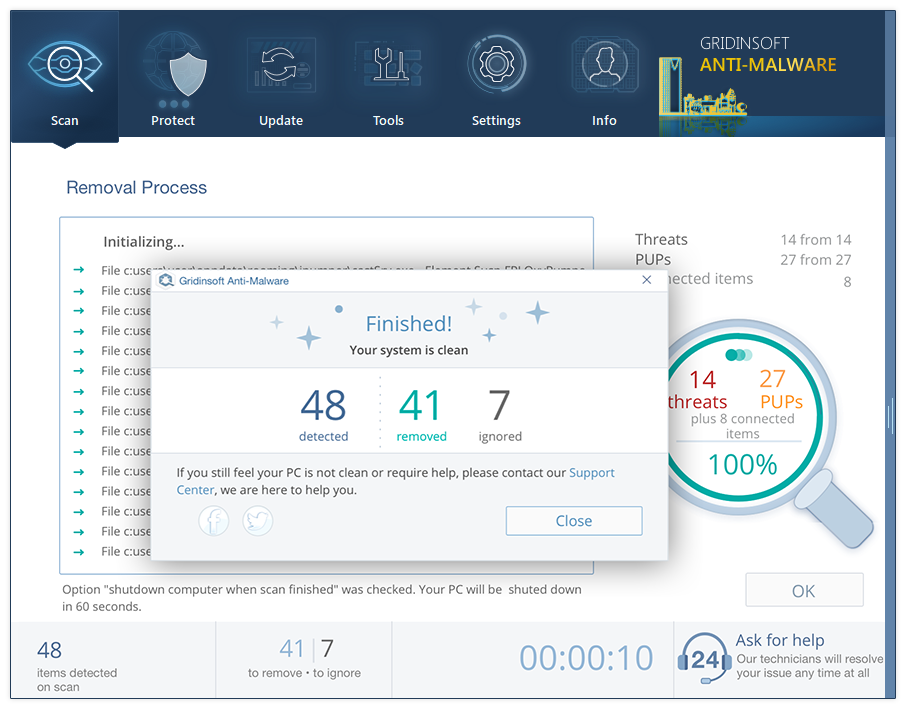Our research team discovered a suspicious page promoting an installation setup that contains the Streaming adware-type application. Upon examining this app, we determined that it is supported by advertising, which means it displays unwanted and deceptive ads.
The purpose of Streaming adware is to generate revenue for developers by displaying undesirable and misleading advertisements. This software allows ads to be placed on visited websites and other interfaces.
The advertisements primarily promote online scams, unreliable or harmful software, and potential malware. Some intrusive ads may even initiate stealthy downloads or installations when clicked.
| Name | Ads by Streaming |
| Type | Adware |
| Damage | System infections, privacy breaches, financial losses, and potential identity theft |
| Fix Tool | See If Your System Has Been Affected by Streaming Virus |
Overview of Streaming Adware
It is important to note that legitimate products or services are unlikely to be promoted in this manner by their developers or official parties. It is more probable that scammers abuse affiliate programs to earn illegitimate commissions.
Advertising-supported software may require specific conditions, such as a compatible browser or system, or visits to particular websites, to run intrusive ad campaigns. Even if Streaming doesn’t display ads, its presence on a system poses a threat.
Additionally, most adware-type apps collect sensitive information, and Streaming might do the same. The gathered data usually includes browsing and search engine histories, Internet cookies, usernames and passwords, personally identifiable details, and financial information. This data can be sold to third parties or exploited for profit.
In summary, advertising-supported software can lead to system infections, serious privacy issues, financial losses, and even identity theft.
Samples of adware
Our research team has investigated thousands of adware samples, including LuckyWheel and Fast Incognito Modeto name a few of our recent discoveries.
Advertising-supported software often appears legitimate and offers a variety of useful features. However, these functionalities are rarely operational and serve as bait to deceive users into downloading and installing the software. It’s important to emphasize that even if an app works as promised, it doesn’t guarantee its legitimacy or safety.
How did Streaming install on my computer?
We obtained an installer containing Streaming from a deceptive webpage. Adware often has “official” promotional pages in addition to various scam sites. Visitors to such webpages typically arrive through redirects caused by websites that use rogue advertising networks, misspelled URLs, intrusive ads, spam browser notifications, or installed adware with browser force-opening capabilities.
Intrusive advertisements also contribute to the proliferation of advertising-supported software. Some of these ads, when clicked, can initiate downloads or installations without user consent.
Adware can also be bundled with ordinary programs. The risk of unintentionally allowing bundled content into the system increases when downloading from dubious channels such as freeware and third-party websites, Peer-to-Peer sharing networks, and so on. Neglecting installation processes, such as ignoring terms or using “Easy/Quick” settings, further enhances the risk.
How to avoid installing adware?
We strongly recommend researching software and only downloading from official and trustworthy sources. Additionally, installation processes should be approached with caution. We advise reading the terms, inspecting available options, using the “Custom/Advanced” settings, and opting out of all additional components, such as applications, extensions, features, and tools.
Another crucial recommendation is to exercise vigilance while browsing since fake and dangerous online content often appears legitimate and harmless. For instance, intrusive ads may seem harmless but actually redirect to highly questionable sites promoting scams, adult dating, pornography, gambling, and more.
If you continuously encounter such ads or redirects, check your system and promptly remove any suspicious apps, browser extensions, or plug-ins. If your computer is already infected with Streaming, we recommend running a scan with Gridinsoft Anti-Malware to automatically eliminate this adware.
How to remove the Streaming from my PC?
Streaming malware is extremely hard to remove manually. It stores its documents in multiple places throughout the disk, and can recover itself from one of the parts. Furthermore, various alterations in the registry, networking setups and also Group Policies are quite hard to discover and change to the initial. It is far better to utilize a special tool – exactly, an anti-malware program. GridinSoft Anti-Malware will definitely fit the best for virus removal goals.
Why GridinSoft Anti-Malware? It is pretty light-weight and has its databases updated almost every hour. Moreover, it does not have such bugs and exploits as Microsoft Defender does. The combination of these details makes GridinSoft Anti-Malware ideal for getting rid of malware of any type.
Remove the Streaming with GridinSoft Anti-Malware
- Download and install GridinSoft Anti-Malware. After the installation, you will be offered to perform the Standard Scan. Approve this action.
- Standard scan checks the logical disk where the system files are stored, together with the files of programs you have already installed. The scan lasts up to 6 minutes.
- When the scan is over, you may choose the action for each detected virus. For all files of Streaming the default option is “Delete”. Press “Apply” to finish the malware removal.



Frequently Asked Questions (FAQ)
Streaming adware is a type of software that displays unwanted and deceptive advertisements on websites and other interfaces.
It can be installed through deceptive webpages, redirects caused by rogue advertising networks, misspelled URLs, intrusive ads, spam browser notifications, or bundled with other programs downloaded from dubious sources.
This type of adware can lead to system infections, compromise your privacy by collecting sensitive information, result in financial losses, and potentially lead to identity theft.
Yes, Streaming adware may still pose a threat to your system even if it doesn’t display ads, as it can collect sensitive information and perform other malicious activities in the background.
To avoid installing adware, it is important to research software and download only from official and trustworthy sources. Additionally, exercise caution while browsing, avoid clicking on intrusive ads, and be vigilant during the installation process, opting for custom or advanced settings to review and deselect any additional components.
If you suspect that your computer is infected with Streaming adware, it is recommended to run a thorough scan with reliable anti-malware software, such as Gridinsoft Anti-Malware, to automatically detect and remove the adware.
Yes, it can collect sensitive information from your computer, including browsing history, usernames/passwords, and personal details. This information can be sold to third parties or used for malicious purposes.
Legitimate products or services are unlikely to be promoted through Streaming adware. Advertisements displayed by adware are more likely to promote online scams, unreliable software, or potentially harmful content.
It is essential to have up-to-date antivirus or anti-malware software installed on your computer. Additionally, practicing safe browsing habits, being cautious with downloads, and regularly updating your software can help protect your system from adware and other online threats.
How to Remove Streaming Adware?
Name: Streaming
Description: Streaming is an advertising-supported software that, when installed on a computer, displays unwanted and deceptive advertisements on visited websites and other interfaces, while also collecting sensitive user information such as browsing history, cookies, usernames/passwords, and personal details, which can be sold to third parties or exploited for profit. It poses threats of system infections, serious privacy issues, financial losses, and even identity theft.
Operating System: Windows
Application Category: Adware


